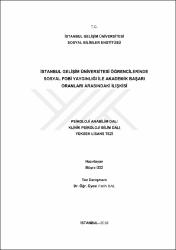İstanbul Gelişim Üniversitesi Öğrencilerinde Sosyal Fobi Yaygınlığı ile Akademik Başarı Oranları Arasındaki İlişkisi
Özet
Sosyal fobi bozukluğu; performans sergilemek, başkaları karşısında konuşmak, yemek yemek, yazı yazmak, bir başkası ile iletişime geçmek gibi sosyal faaliyetlerden kaçınma ve de korkma durumudur. Bu durumun oluşmasının nedeni ise, bu faaliyetlerin yapıldığı sırada yoğun bir şekilde rezil olma, aşağılanma, sosyal red alma vb. korkuların yaşanmasıdır. Sosyal fobide yaşanan bu korkular akademik açıdan başarı faktörünü de etkilemektedir. Bu araştırmada sosyal fobinin (toplumsal kaygı bozukluğunun) öğrencilerde yaygınlığı ve bunun akademik başarıya ne derecede etki ettiği incelenmiştir. Araştırma kapsamına 2017-2018 eğitim - öğretim yılında İstanbul Gelişim Üniversitesi' nde eğitim gören 89 kadın, 61 erkek toplamda 150 üniversite öğrencisi alınmıştır. Katılımcılar araştırmaya gönüllülük esasına göre, çalışma hakkında bilgilendirilip, kabul etmeleri doğrultusunda katılım sağlamışlardır. Araştırmada değerlendirmeler için Liebowitz Sosyal Fobi Ölçeği (LSFÖ) ve öğrencinin yaş, cinsiyet, not ortalamalarının sorulduğu mini kişisel bilgi formu kullanılmıştır. Öğrencilerin okudukları bölümlerde çeşitli derslerde elde ettikleri başarı oranları, yılsonu not ortalamaları ölçüt olarak alınmıştır. Araştırmada elde edilen veriler SPSS (Statistical Package for Social Sciences) 24.0 programı kullanılmış olup bu program ile analiz edilmiştir. Veriler analiz edilirken, tamamlayıcı istatistiksel metotlar (sayı, yüzde, ortalama, standart sapma) kullanılmıştır. Niceliksel verilerin karşılaştırılmasında iki grup durumunda ve parametrelerin gruplar arası karşılaştırmalarında bağımsız örnekler (independent samples) t testi kullanılmıştır. Niceliksel verilerin karşılaştırılmasında ikiden fazla grup durumunda ve parametrelerin gruplar arası karşılaştırmalarında Tek yönlü (One way) Anova testi ve farklılığa neden olan grubun tespitinde Bonferroni testi kullanılmıştır. Yılsonu notu ve Sosyal Fobi yaygınlığı arasındaki ilişkilerin incelenmesi için Pearson Korelasyon Analizi kullanılmıştır. İstatistik anlamlılık düzeyi p<0,05 olarak değerlendirilmiştir. Araştırmanın bulgularına göre; Öğrencilerin sosyal kaygı toplam puanları ortalamalarının cinsiyet değişkenine göre anlamlı bir farklılık gösterip göstermediğini belirlemek amacıyla yapılan t-testi sonucunda ortalamalar arasındaki fark istatistiksel açıdan anlamlı bulunmamıştır. Öğrencilerin yılsonu notu ortalamalarının sınıf değişkenine göre istatistiksel açıdan anlamlı bulunmuştur. Lisans 4. sınıf olan öğrencilerin yılsonu notu ortalamaları, lisans 2. ve lisans 3. sınıf olan öğrencilerin yılsonu notu ortalamalarından yüksek bulunmuştur. Lisans 4. sınıf olan öğrencilerin sosyal kaygı toplam puanları, lisans 2. ve lisans 3. olan öğrencilerin sosyal fobi toplam puanlarından düşük bulunmuştur. Buna göre, öğrencilerin sosyal fobi toplam puanları arttığı zaman, yılsonu not ortalamalarının düşük olduğu bulunmuştur. Öğrencilerin sosyal fobi yaygınlığı ile akademik başarılarının ilişkili olduğu saptanmıştır. Sonuçta ise literatür ışığında tartışılmış ve çeşitli önerilerde bulunulmuştur. Anahtar Sözcükler: Sosyal Fobi, Üniversite Öğrencisi, Akademik Başarı. Social phobia disorder is defined as the condition when someone both tends to run away from social activities and fears of performing, speaking in front of the others, eating, writing and communicating with someone else. The reasons why stated condition happens are because of having fear of being intensely ashamed when performing, being humiliated, being disapproved socially and so on. Those fears in social phobia disorder affect on success factor in academic way, as well. In this research studies to what extend social phobia (social anxiety disorder) is common among the students and has affect on academic standing. The scope of research includes 89 women and 61 men in total 150 undergrads studying at İstanbul Gelişim University in 2017-2018 academic year are used as participants. Those participants already informed about study and in accordance with accepting the terms have contributed according to voluntary basis. İn the research, Liebowitz Social Phobia Scale (LSPS) and a mini personal information form that includes the ages, genders and grade avarages of students have been used for the evaluations. The rate of success collected by the students from different courses of different departments and grade point average are taken as a criterion. The data collected with the research has used SPSS (Statistic Package for Social Sciences), and also it has been analyzed via SPSS. While the data is being analyzed, complementary statistical methods (numbers, percentage, mean, standard deviation) are used. independent samples t test has been used in the comparison of quantative data in case of two groups and in the comparison of parameters among the groups. One Way Anova test has been used in the comparison of quantative datas in case of more than two groups and comparison of parameters among the groups. And Bonferrani Test has been used for the determination of the group that caused difference. Pearson Correlation Analysis is used to analyze the relation between the grade point average and the prevalence of social phobia. Statistical significancy is evaluated as p<0,05. According to the findings of the research, the discrimination of the averages which is the result of the t-test carried out to determine whether the average of total point of social anxiety differs from sexuality variable meaningfully or not has not been found meaningfully in terms of statistic. The general point average of the 4th grade undergrads is found out higher than those students who are 2nd and 3th grade at bachelor's level. The total point of social anxiety of the 4th grade undergrads is found out less than the total point of those students who are 2nd and 3th grade at bachelor's level. According to this finding, the more the total point of social anxiety that the students have the less general point average have been found out. The relationship between the prevalence of social phobia of the students and academic standing have been confirmed. In conclusion, in the light of literature it has been carried out and suggested variable proposals. Key words: Social Phobia, Undergrads, Bachelor's level, Academic Standing.
Bağlantı
http://hdl.handle.net/11363/1167Koleksiyonlar
- Yüksek Lisans Tezleri [572]
Aşağıdaki lisans dosyası bu öğe ile ilişkilidir:


















